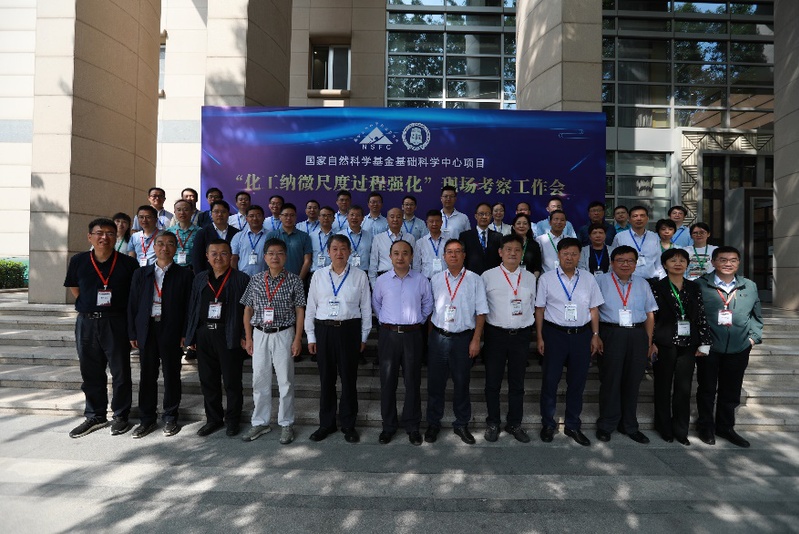On August 30, 2022, the National Natural Science Foundation of China (hereinafter referred to as NSFC) organized a site inspection to the Chemical Micro-Nanoscale Process Enhancement Basic Science Center project, which was supported by Beijing University of Chemical Technology (BUCT) and jointly applied by Xiamen University and Zhejiang University. The visit was hosted by the Department of Chemical Sciences of the Natural Science Foundation (NSFC) and organized by Beijing University of Chemical Technology (BUCT).

Academician Xie Xincheng, Deputy Director of NSFC, attended the meeting. Researcher Liu Guiqin, Secretary of Party Committee of BUCT, Academician Tan Tianwei, President of the University, Professor Ren Zhongqi, Vice President of the University, researcher Yang Junlin, Executive Deputy Director of the Department of Chemical Sciences of NSFC, researcher Zhan Shige, Deputy Director of the Department of Chemical Sciences of NSFC, staff of the inspection team, the project team, the Department of Chemical Sciences of NSFC, attended the meeting. The meeting was also attended by the project team, the Department of Chemical Sciences of NSFC, the project sponsor and the collaborators.
Deputy Director Xie Xinsheng pointed out that the Chemical Micro-Nanoscale Process Enhancement is the first Basic Science Center project in the field of chemical engineering that entering the step of site inspection, facing the world's scientific frontier, and dedicating to solve key scientific problems in the national major strategic needs. He hoped that the expert group would make more constructive comments and suggestions during the visit to facilitate the team's thinking and promote the subsequent operation of the project more smoothly. And he hoped that with the support of the Basic Science Center project, the research team should gain more experience from basic research to engineering application, so as to build a chemical basic research team with international first-class research level.
President Tan Tianwei emphasized that Chemical Micro-Nanoscale Process Enhancement is the first basic science center project that BUCT responsible for. The university pays great importance and provides all-round support to the operation and development of the project in accordance with the relevant regulations and construction requirements of NSFC, which fully guarantee the implementation of the project goes smoothly.
Professor Chen Jianfeng, the project leader, reported on the proposed research work, research plan, expected goals and possible major breakthroughs in the next five years. The expert group listened carefully and conducted group interviews with the project leader, key members, management personnel of the supporting unit and the cooperating unit. They gained an in-depth understanding of the project research basis, cross-fertilization, research conditions and guarantee measures, and comprehensively examined the supporting conditions of the supporting unit and the cooperating unit.
After careful discussion, the expert group unanimously agreed that the project is in line with the positioning requirements of NSFC basic science center projects. The project is significant, the division of labor is clear, the research plan is reasonable and feasible, and both the relying unit and the collaborating unit have sufficient implementation basis and guarantee. The project is recommended to start.

This project will focus on core scientific problems of flow transfer reactions and cross-scale synergistic mechanisms at the micro-nanoscale, use in situ observation and process enhancement of micro-nano fluids as scientific means to build a cross-scale theoretical system from molecular to nanoscale to macroscale, expand the frontier discipline of molecular chemical engineering, and create a new direction of molecular chemical engineering. In addition, we will develop the theory and core key technologies of process intensification at the micro-nanoscale, create a platform for green molecular manufacturing technology, and realize engineering applications in carbon neutralization, ultra-high-purity chemicals for big data centers and integrated circuits, and new energy electrochemistry.
